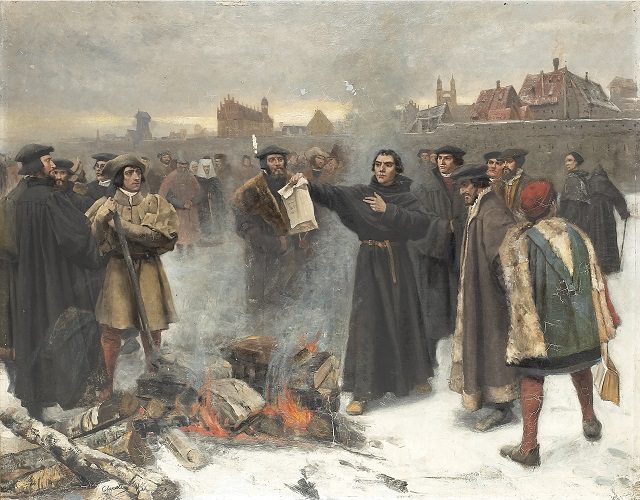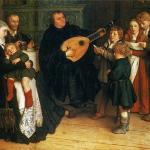
Anti-Catholic Reformed Protestant Luther expert James Swan had a lively exchange with a Catholic (Mark Rome) on the anti-Catholic CARM forum. I am concentrating on this particular back-and-forth:
Mark Rome: Luther was excommunicated and declared a heretic for many issues including his insistence on sola scriptura and setting himself up (and every individual) as the private judge of faith.
James Swan: Where? In the Edict of Worms? That was the most important document that declared him a heretic. Read the “Items” in the Edict, Where was Luther condemned for “sola scriptura” and “setting himself up (and every individual) as the private judge of faith“? Perhaps you’re reading the document differently than I am, or perhaps I simply missed these points in my old age.
I suspect that it’s a combination of things, meself: extreme anti-Catholic bias clouding his objectivity in reading anything Catholic, and perhaps also the maladies of old age; for these aspects are clear in the Edict, as well as in the books of Luther that it condemned as heretical.
I have documented fifty of the things where Luther had departed from received Catholic doctrine and practice, by 1520, a year before the Diet of Worms in 1521, which was the famous confrontation where Luther — at length — proclaimed:
Unless I am convinced by the testimony of the Scriptures or by clear reason (for I do not trust either in the pope or in councils alone, since it is well known that they have often erred and contradicted themselves), I am bound by the Scriptures I have quoted and my conscience is captive to the Word of God. I cannot and will not recant anything, since it is neither safe nor right to go against conscience. May God help me. Amen.
This statement itself is a clear declaration of the principle of sola Scriptura as a rule of faith. Sola Scriptura, as defined by all the best Protestant theologians and apologists, means that the Bible is the only final and infallible authority in matters of Christian doctrine. Nothing else is infallible: and this includes ecumenical councils, the Catholic Church, and sacred tradition, as passed down by the Catholic Church. Sola Scriptura itself logically reduces to a radically individualistic scenario of private judgment, since Scripture still requires interpretation, and Protestants have always massively disagreed with each other on that score from the beginning.
Therefore, in the final analysis, each Protestant individual can and may decide for himself or herself which theological proposition is true and which isn’t. It can’t be otherwise, since this was the very principle Luther himself exercised, when he decided to go off on his own. Then, very soon, dozens of other Protestant sects decided to use his same principle: except that they profoundly disagreed with Luther in its application, concerning doctrines such as (most notably) the Real Presence in the Eucharist, and the effects and nature of baptism. This division and sectarianism drove Luther nuts — bothered him to no end — ; but he never showed how it wasn’t permissible or to be expected based on his own notion of sola Scriptura.
Thus, Swan’s query has already been answered by Luther himself in his famous statement of defiance and rebellion against the theological status quo: just prior to the Edict of Worms of 25 May 1521 (issued by by Holy Roman Emperor Charles V). But there is far more evidence than just that.
At the Diet of Worms, Luther was asked to renounced and retract the works he had written, that contained numerous heresies (judged to be so by the received Catholic “three-legged stool” of Scripture-Church-Tradition). These included two of his three famous treatises, written in 1520: To the Christian Nobility of the German Nation and The Babylonian Captivity of the Church. I drew from these two works and a few other documented statements of Luther, in compiling his fifty departures from precedent and required Catholic belief and practice.
Here are some of his false statements, having to do with sola Scriptura and private judgment:
“[I]f we are all priests . . . why should we not also have the power to test and judge what is right or wrong in matters of faith?” (To the Christian Nobility of the German Nation; in Three Treatises [Philadelphia: Fortress Press], taken from Luther’s Works, revised edition, 1970, p. 21)
[private judgment and sola Scriptura: radical innovations concerning Christian authority]
“The Romanists have no basis in Scripture for their claim that the pope alone has the right to call or confirm a council.” (Ibid., p. 22)
[overthrows the long-established principle of governance of ecumenical councils; on p. 23 he states that when the pope is “an offense to Christendom, the first man who is able should . . . do what he can to bring about a truly free council” and on p. 24 says that “we” can “excommunicate” the pope if he has gone astray]
These are from one of the works that Luther was asked to recant and denounce. And so the Edict of Worms makes reference to these sorts of radically anti-traditional notions of the rule of faith:
He despises and condemns the doctrines and authorities which the holy doctors preceding us have left for our instructions, . . .
Furthermore, he is not ashamed to detract from and speak evil of the sacred and holy general councils. Among these he has primarily destroyed (as much as he was able to) the holy Council of Constance, . . .
Luther appeared here in Worms before us and before the princes, prelates, and other people from the several estates. Following our order, we had him questioned, asking him first if, yes or no, he had written the books which were then named and shown to him and [secondly] if he wanted to revoke the contents of these books concerning things against the Catholic faith, the sacred general councils, the apostolic decrees, and the church rites and customs observed and kept by our predecessors and by us down to the present day. We requested of the said Luther, both in our name and in that of all our assistants, that he be willing to return humbly to the unity and communion of our Mother Church. And even then it would have been easy to convert him and soften his heart if the said Luther had not been as obstinate as a rock.
Luther admitted before us and before the princes and the people of the diet that the books named were his and that he could not and would not ever deny them. . . .
Nevertheless, through evil words and gestures towards our priests, he publicly pronounced that he would not change one word of the contents of his books, declaring in our presence and in that of the diet that the apostolic decrees and the holy general councils contradicted each other more than once. As far as he was concerned, he did not hold these decrees and councils to be true, and he would not revoke one thing of what he had written until he was convinced otherwise by the Holy Scriptures or by divine authority. . . .
He said that not only was he suspicious of each one of us, but that even if a general council were assembled, he still would not submit to it. And, if we were informed correctly, he even dared say with his polluted mouth that the things of the gospel and the Catholic faith have never been treated well by the general councils. Luther has appealed from the sentence of our Holy Father the pope to the general council as his last resort, even though he has said so many wicked and insulting things and has written such evil things about the general councils.
Al of this occurred after Luther had been excommunicated. The Church was still trying to give him a chance to repent of his errors. Luther was warned about possible excommunication in Exsurge Domine: a papal bull promulgated on 15 June 1520 by Pope Leo X. He failing to heed that advice, and in fact publicly burned the Bull on 10 December 1520. Then Decet Romanum Pontificem was issuedon January 3, 1521 by the same pope. It excommunicated Martin Luther. The former document made reference, in effect, to the idea of sola Scriptura in its full consequences: a rebellion against the divinely established authority of the Catholic Church. It stated:
We beseech you also, Paul, to arise. It was you that enlightened and illuminated the Church by your doctrine and by a martyrdom like Peter’s. For now a new Porphyry rises who, as the old once wrongfully assailed the holy apostles, now assails the holy pontiffs, our predecessors.
. . . Some, putting aside her true interpretation of Sacred Scripture, are blinded in mind by the father of lies. Wise in their own eyes, according to the ancient practice of heretics, they interpret these same Scriptures otherwise than the Holy Spirit demands, inspired only by their own sense of ambition, and for the sake of popular acclaim, as the Apostle declares. In fact, they twist and adulterate the Scriptures. As a result, according to Jerome, “It is no longer the Gospel of Christ, but a man’s, or what is worse, the devil’s.” . . .
One of the 41 propositions condemned is the following:
29. A way has been made for us for weakening the authority of councils, and for freely contradicting their actions, and judging their decrees, and boldly confessing whatever seems true, whether it has been approved or disapproved by any council whatsoever.
James Swan appears to be confusing the Edict of Worms with Exsurge Domine. He refers to “items” listed. That sounds like the 41 things enumerated in Exsurge Domine. Assuming he was referring to that listing, he claimed that none had anything to do with private judgment or sola Scriptura. But #29 clearly does, since the denigration of ecumenical councils as no longer infallible authorities is part and parcel of sola Scriptura, and in fact, was a key idea in coming up with sola Scriptura in the first place (arguably traced to 1519 and the Leipzig Disputation).
Swan also claimed that the Edict of Worms was “the most important document that declared him a heretic.” It was not. The two papal encyclicals were that. The Holy Roman Emperor was not even part of the hierarchy of the Catholic Church.
Swan will be informed of this refutation, but he’ll ignore it, as he has any such refutations by myself for several years now. I’m blocked from both Swan’s blog and the CARM forums . . .
***
Photo credit: Luther burns the Papal bull in the square of Wittenberg year 1520 (1885), by Karl Aspelin (1857-1922) [public domain / Wikimedia Commons]













